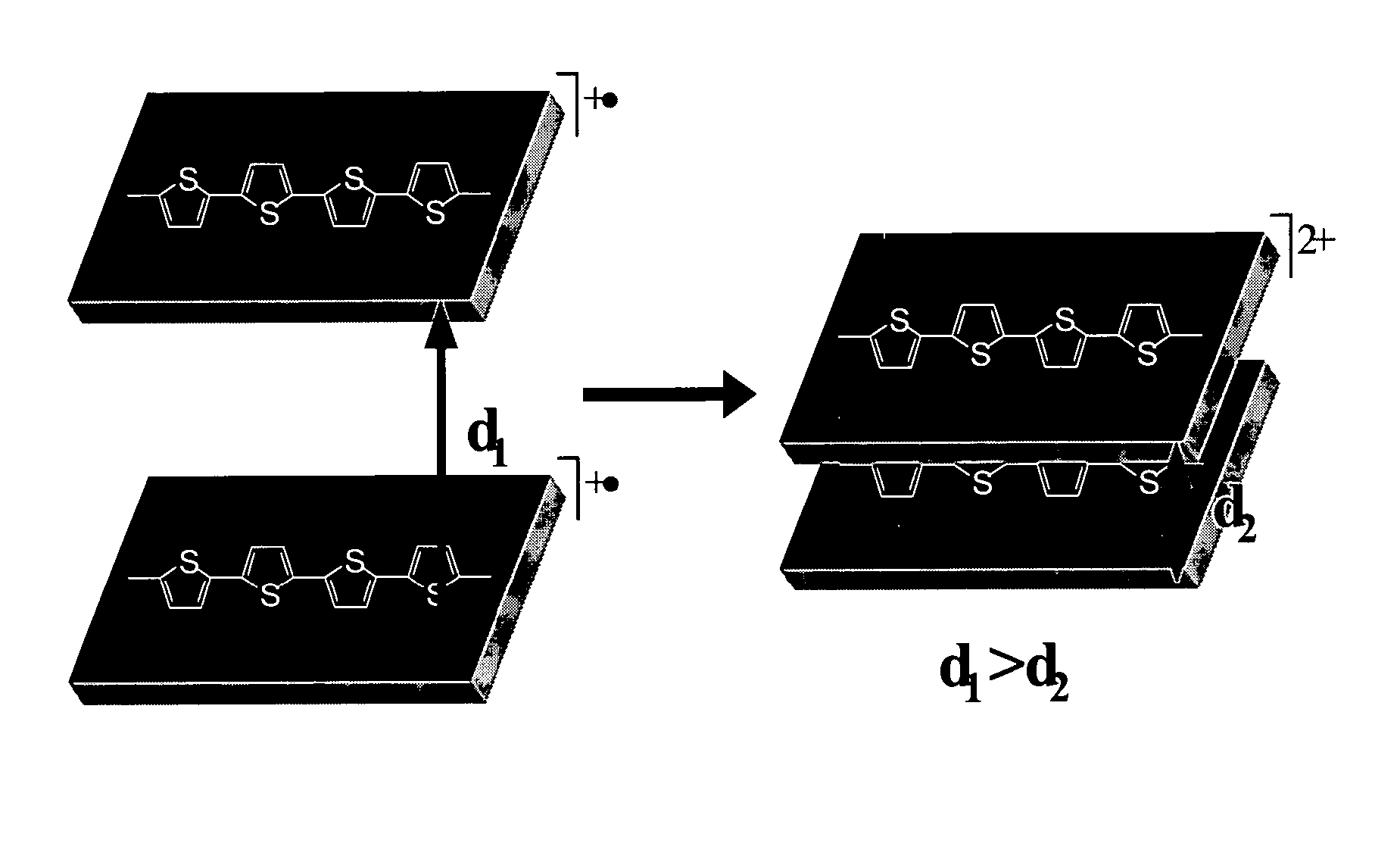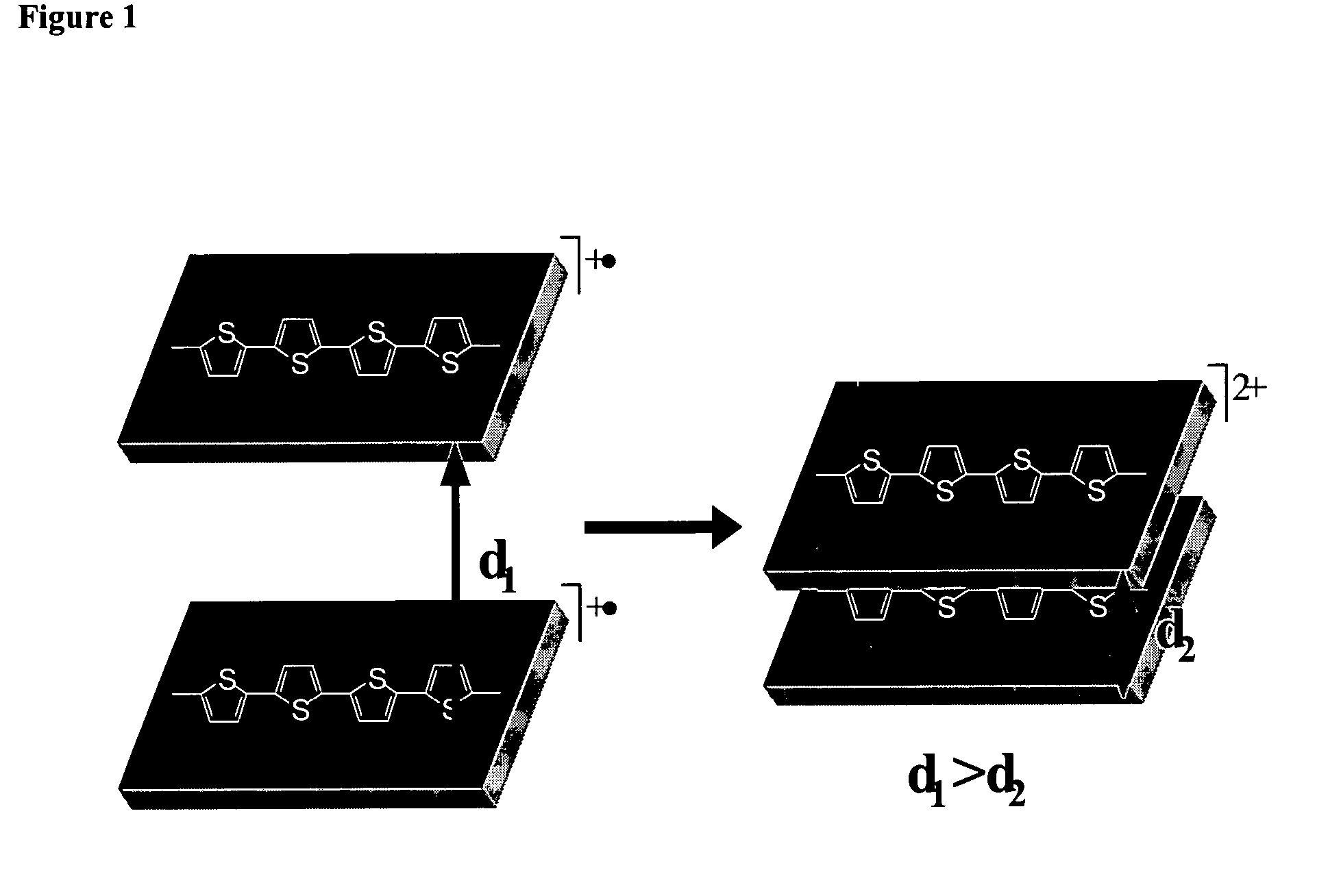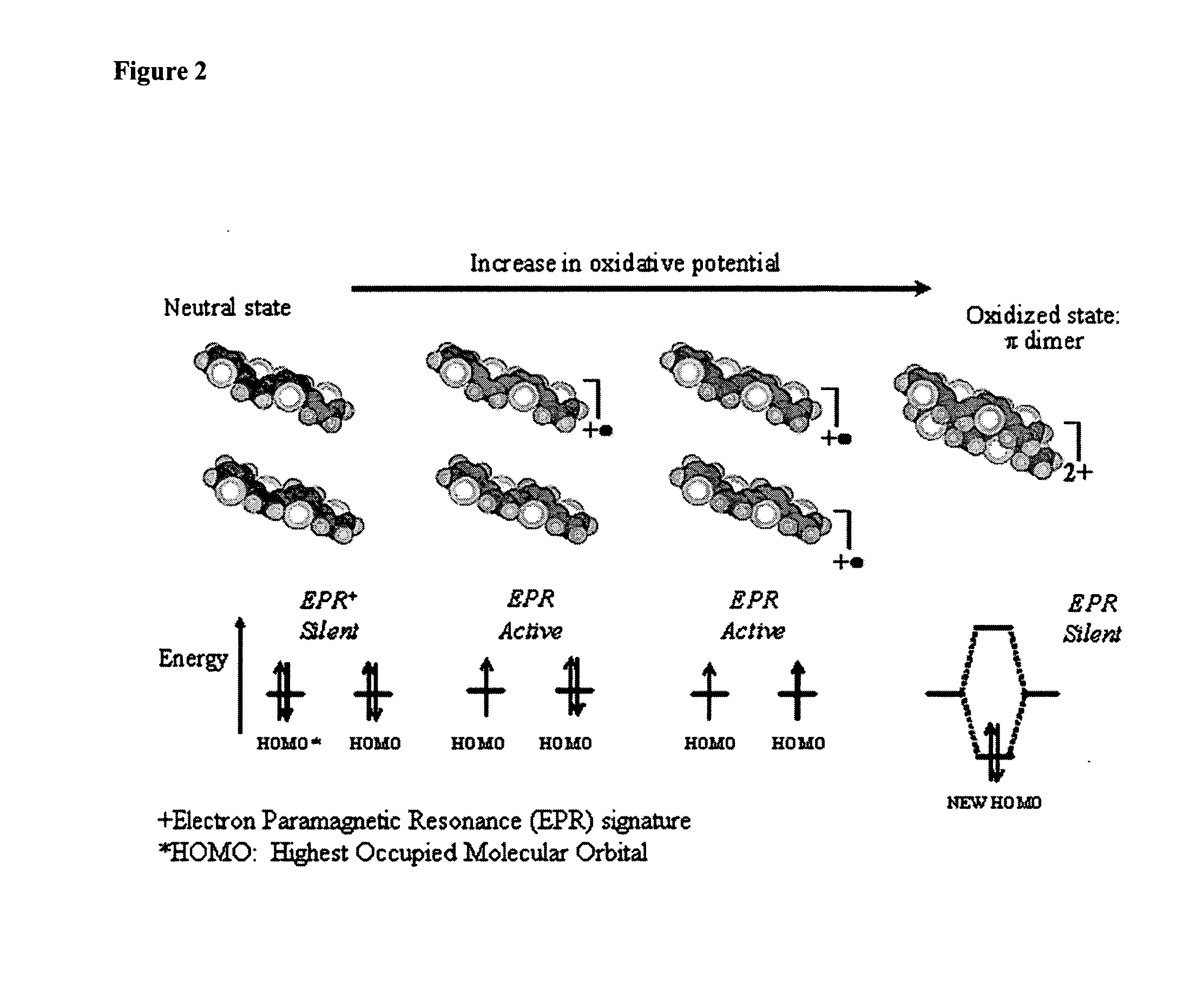Molecular actuators, and methods of use thereof
a technology of actuators and actuators, applied in the direction of non-metal conductors, conductors, organic chemistry, etc., can solve the problems of thiophene based polymers, however, which are brittle and difficult to handl
- Summary
- Abstract
- Description
- Claims
- Application Information
AI Technical Summary
Benefits of technology
Problems solved by technology
Method used
Image
Examples
example 1
[0326] Calix[4]arene-bis-thiophene and quarterthiophene (QT) monomers were designed and synthesized in our laboratory according to synthesis techniques presented elsewhere and their structure verified by NMR. Yu H.-h., Pullen A. E. and Swager T. M., “Toward New Actuating Devices: Synthesis and Electrochemical Studies of Poly(11,23-bis[2,2′-bis-thiophene]-5-yl)-26,28-dimethoxycalix[4]arene-25,27-diol)”, Polymer Science Material Engineering, Vol. 83, (523): 2000. Tetraethylammonium hexafluorophosphate (TEAP), Tetrabutylammonium hexafluorophosphate (TBAP), dichloromethane and acetonitrile were obtained from Aldrich. Several Sulfated Poly(β-HydroxyEther) (S-PHE) polyanions candidates with different MR sulfation ratio were synthesized according to the method of Wemet. Wemet W. and Stoffer J., U.S. Pat. No. 5,061,401, 1991. Ag / Ag+ reference electrodes (BAS Bioanalytical Systems) were constructed from 0.1 M TEAP and 0.01 M AgN03 in acetonitrile and referenced versus the Fc / Fc+ redox couple...
example 2
on of thienyl substituted calix[4]arenes
[0327]
Preparation of 26,28-dimethoxycalix[4]arene-25,27-diol (Method a)
[0328]
[0329] A suspension of calix[4]arene (17.0 g, 40 mmole), anhydrous potassium carbonate (6.08 g, 44 mmole), and methyl tosylate (14.9 g, 80 mmole) were refluxed in CH3CN (500 mL) overnight. After evaporation of the solvent, the mixture was taken up in CH2Cl2 and washed with 1 N HCl and brine. The organic layer was dried with MgSO4 and the solvent was removed in vacuo to afford the product. It was recrystallized from CH3Cl / MeOH to yield white crystals (18.1 g, 98%). mp>300° C. dec. 1H NMR (500 MHz, CDCl3) δ: 7.76 (s, 2H), 7.08 (d, 4H, J=7.5 Hz), 6.88 (d, 4H, J=7.5 Hz), 6.73 (t, 2H, J=7.5 Hz), 6.68 (t, 2H, J=7.5 Hz), 4.31 (d, 4H, J=13.0 Hz), 3.99 (s, 6H), 3.41 (d, 4H, J=13.0 Hz). 13C NMR (125 MHz, CDCl3) δ: 153.2, 153.1, 132.9, 129.0, 128.5, 128.1, 125.3, 119.1, 63.7, 31.1.
Preparation of 25,27-dimethoxycalix[4]arenecrown-5 (Method b)
[0330]
[0331] 26,28-dimethoxycalix[4...
example 3
on of bis-(bis-thiophene-5-yl)dipropoxycalix[4]arene
[0346]
Preparation of bis-(bis-thiophene-5-yl)dipropoxycalix[4]arene (Method c)
[0347] In an airfree tube, dipropyldibromocalix[4]arene (665 mg, 1 mmole), Pd2 dba3 (30 mg, 0.03 mmole), P(tBu)3 (0.033 mmole), KF (232 mg, 4 mmole), tributylstanny-2,2′-bis-thiophene (2.28 g, 5 mmole), and NMP (10 mL) was mixed together under Ar. The reaction mixture was heated to 50° C. and stirred for 2 days. The mixture was cooled down to room temperature and passed though a short column with CH2Cl2. The solvent was removed the in vacuo and dark brown liquid was obtained. Addition of hexane generate precipitate and the precipitate was collected by filtration. The crude product was further purified by column chromatography (hexane / dichloromethane 4 / 1, 2 / 1, then 1 / 1) to yield light yellow crystal (534 mg, 64%).
PUM
| Property | Measurement | Unit |
|---|---|---|
| dihedral angle | aaaaa | aaaaa |
| dihedral angle | aaaaa | aaaaa |
| thickness | aaaaa | aaaaa |
Abstract
Description
Claims
Application Information
 Login to View More
Login to View More - R&D
- Intellectual Property
- Life Sciences
- Materials
- Tech Scout
- Unparalleled Data Quality
- Higher Quality Content
- 60% Fewer Hallucinations
Browse by: Latest US Patents, China's latest patents, Technical Efficacy Thesaurus, Application Domain, Technology Topic, Popular Technical Reports.
© 2025 PatSnap. All rights reserved.Legal|Privacy policy|Modern Slavery Act Transparency Statement|Sitemap|About US| Contact US: help@patsnap.com



